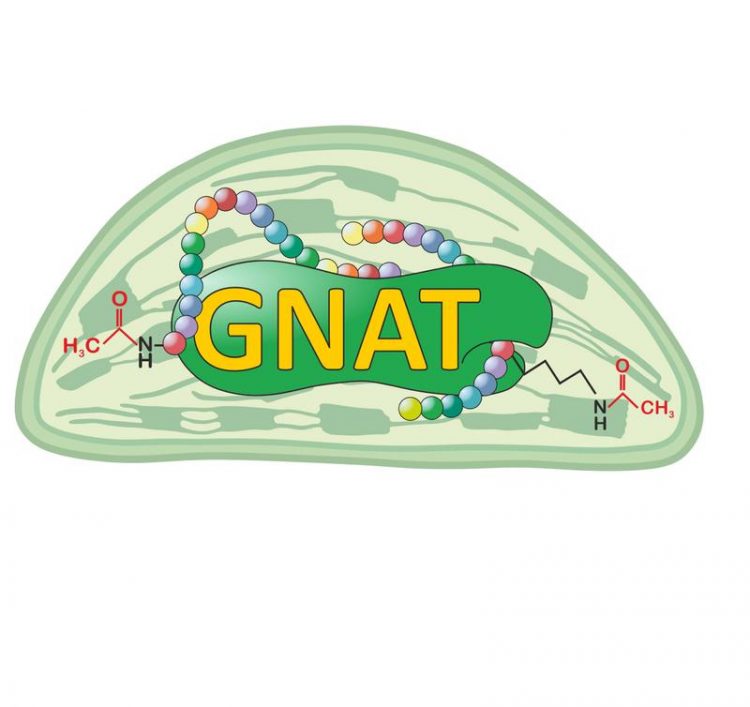Enzymes as double agents: new mechanism discovered in protein modification

Researchers discovered a new family of certain acetyltransferases (GNAT) in the chloroplasts of plant cells (centre). The enzymes can drive two different acetylations on protein sequences (colourful chains of amino acids). Annika Brünje/ Molecular Systems Biology
Proteins are the workers in a cell and, as the “basic element of life”, are responsible for the most widely varying metabolic processes. In plants, for example, they take on an important function in photosynthesis.
In order to be able to work purposefully, proteins change their chemical form after they have been produced in a cell – for example, through protein acetylation, when an acetyl group is transferred to the protein.
The role of the “driver” is played by enzymes, so-called acetyltransferases. Not much is known, however, about the precise mechanisms underlying the process.
An interdisciplinary team of researchers from Germany, Finland and France have now found eight new acetyltransferases in a cell organelle in plants. In doing so, the researchers made a surprising discovery: the enzymes identified are catalytically active in the cell in a twofold way – in other words, they facilitate reactions in different ways. It had previously been assumed that different acetylations were driven by different enzymes.
“Our study shows an entirely new complexity within the enzyme machinery,” says Prof. Iris Finkemeier from the University of Münster, who led the study together with Dr. Carmela Giglione from the University of Paris-Saclay. “The results strongly suggest that there are also other enzymes which can display such ‘double activities’ in eukaryotic cells”.
For one of the newly identified enzymes, the researchers have already been able to demonstrate that it has an important function in photosynthesis.
“Our long-term aim is to understand the processes steered by acetylation and perhaps make photosynthesis more efficient,” says PhD student Annika Brünje from Münster University, who is one of the two lead authors of the publication, along with Dr. Willy Bienvenut from the University of Paris-Saclay. The study has been published in the journal “Molecular Systems Biology”.
Background and method:
For the experiments, the researchers used the model plant Thale Cress (Arabidopsis thaliana). They took a closer look at two important ways of protein modification: so-called N-terminal acetylation and lysine acetylation.
In these modifications, an acetyl group is transferred either to the end of the protein called the N-terminus or to the lysine residue. Both processes are very often found in proteins in chloroplasts, which are the cell organelles in which photosynthesis takes place.
In order to find out which enzymes play a role in this process, the researchers first used a protein database to identify possible acetyltransferases, and in addition they located the occurrence of the proteins in the cell (subcellular localization). In this way, they discovered in the chloroplasts a new family of certain acetyltransferases, known as GNAT.
Using quantitative mass spectrometry methods, the researchers were also able to show that the enzymes are active in both the N-terminal acetylation and the lysine acetylation changing the proteins accordingly. Conversely, the researchers noticed that when they deactivated one of the enzymes through genetic modifications, neither of the acetylations functioned properly anymore.
In further studies, the researchers aim initially to discover which functions the individually identified enzymes have. “We expect to discover even more new process in the coming years which these enzymes regulate in the chloroplasts,” says Carmela Giglione from the University of Paris-Saclay.
Institutions involved and funding:
In addition to the Universities of Münster and Paris-Saclay, France, the Universities of Heidelberg, Turku (Finland) and Tübingen were also involved in the study. The collaboration received funding from the “European Research Area Network for Coordinating Action in Plant Sciences” (ERA-CAPS), which is a research programme funded by the EU, as well as from the German Research Foundation, the “Agence nationale de la recherche” in France, the “Academy of Finland” and the Universities of Münster and Turku.
Prof. Dr. Iris Finkemeier (Universität Münster)
Tel: +49 251 83-23805
iris.finkemeier@uni-muenster.de
W. V. Bienvenut, A. Brünje et al. (2020): Dual lysine and N-terminal acetyltransferases reveal the complexity underpinning protein acetylation. Molecular Systems Biology; DOI: 10.15252/msb.20209464
https://www.embopress.org/doi/10.15252/msb.20209464 Original publication in “Molecular Systems Biology”
https://www.uni-muenster.de/Biologie.IBBP/agfinkemeier/ Research group Prof. Iris Finkemeier at Münster University
Media Contact
All latest news from the category: Life Sciences and Chemistry
Articles and reports from the Life Sciences and chemistry area deal with applied and basic research into modern biology, chemistry and human medicine.
Valuable information can be found on a range of life sciences fields including bacteriology, biochemistry, bionics, bioinformatics, biophysics, biotechnology, genetics, geobotany, human biology, marine biology, microbiology, molecular biology, cellular biology, zoology, bioinorganic chemistry, microchemistry and environmental chemistry.
Newest articles

Pinpointing hydrogen isotopes in titanium hydride nanofilms
Although it is the smallest and lightest atom, hydrogen can have a big impact by infiltrating other materials and affecting their properties, such as superconductivity and metal-insulator-transitions. Now, researchers from…

A new way of entangling light and sound
For a wide variety of emerging quantum technologies, such as secure quantum communications and quantum computing, quantum entanglement is a prerequisite. Scientists at the Max-Planck-Institute for the Science of Light…

Telescope for NASA’s Roman Mission complete, delivered to Goddard
NASA’s Nancy Grace Roman Space Telescope is one giant step closer to unlocking the mysteries of the universe. The mission has now received its final major delivery: the Optical Telescope…



